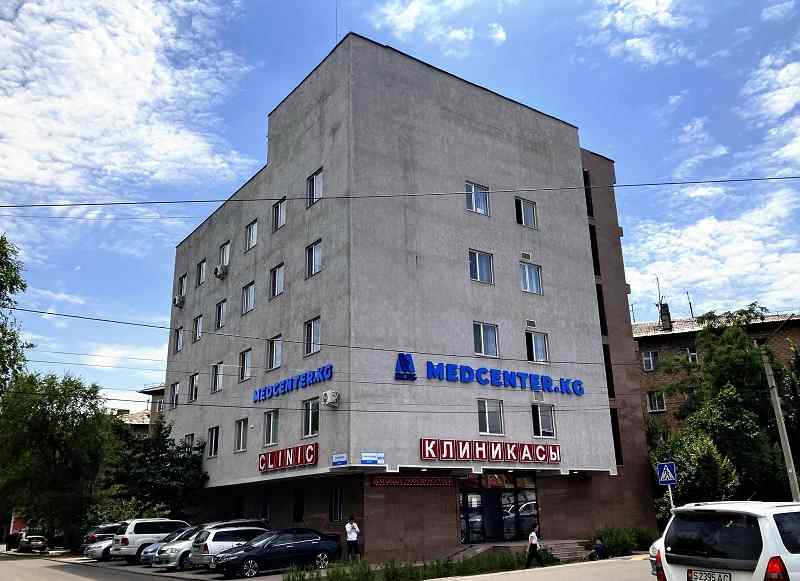Reality of overseas organ transplants / NPO-related operations in Kyrgyzstan caused harm to recipient

The hospital where a Japanese woman was admitted and received a living donor kidney transplant in December last year under the guidance of a Tokyo-based NPO (This photo was taken on June 24 in Bishkek.)
The Yomiuri Shimbun
10:28 JST, August 22, 2022
In a recently publicized case of suspected organ trafficking, a living donor kidney transplant was conducted overseas with a Tokyo-based nonprofit organization acting as an intermediary. This is the first installment of a series on the current state of transplant operations carried out overseas.
The main street is lined with hotels and shops, but one turn down a side street takes the visitor into a different world of old, low-rise buildings. The street is dirty and filled with cracks, and dust swirls as cars pass by.
It is late June and a Yomiuri Shimbun reporter is in Bishkek, the capital of the former Soviet republic of Kyrgyzstan, some 5,500 kilometers west of Tokyo.
A 10-minute taxi ride from the city center takes the reporter to a residential area lined with apartments and detached houses. On a signboard, the English word “Clinic” comes into view. It is on the lightly stained wall of a six-story building.
Inside, there is a cramped waiting room with only about 10 chairs. The clinic has the usual departments such as surgery and ear, nose, and throat. There is nothing about the facility indicating it is capable of conducting advanced medicine like organ transplants.
Just over six months before in December last year, the clinic had a different name. Around that time, four Japanese people with serious kidney disease seeking transplants visited the facility. It was arranged by a Tokyo-based nonprofit organization called the Intractable Disease Patient Support Association.
What went on in this place in a country so far away?
Signs of trouble
“Is this hospital alright?”
A 58-year-old woman from the Kansai region, who was admitted on Dec. 16 last year, was growing uneasy in her room on the 4th floor.
She had started dialysis after her kidney disease worsened, but as the wait for a kidney transplant can be 10 years or more in Japan, she contacted an NPO she found on the internet.
Told she could receive a kidney transplant in Uzbekistan, she traveled there in June last year to wait for the operation. But in late November, she was suddenly moved by the NPO to neighboring Kyrgyzstan.
Medical equipment was hastily brought to the hospital. After being admitted, she saw first-hand an Israeli woman who had earlier undergone surgery in apparent agony in her room. The doctor who performed the surgery, a 57-year-old Egyptian, would also be the one to operate on her.
“I am worried,” the woman told a staff member of the NPO, who assured her, “It will be alright.” She told herself, “As the [organ] donor has already been decided, if I’m going to have the operation, now is the only time.” The operation was performed on Dec. 18.
Operation goes south
Waking up about a week after the operation, the woman found that instead of the hospital, she was in a hotel room in Bishkek.
She immediately telephoned the director of the NPO in Tokyo. The following is a transcript of the call with the 62-year-old man from recordings obtained by The Yomiuri Shimbun:
Kansai woman: “What am I doing being treated in a hotel? Can you ask the doctor for me?”
NPO director: “They wouldn’t tell me. Nothing.”
Woman: “It’s pretty irresponsible, isn’t it?”
Director: “These things happen in foreign countries.”
The woman’s condition deteriorated from that point and she was transferred by plane to Uzbekistan. There she was admitted into the Nano Medical Clinic, a private hospital in the capital of Tashkent.
When the Yomiuri Shimbun reporter visited the hospital in June this year, a 32-year-old male doctor said he remembered the woman.
She had been brought to the hospital from the airport by ambulance pleading, “It hurts, it hurts.” Her wounds were infected, and further abnormalities were found in a blood test. “I thought she might die within a day or two,” the doctor said.
The woman returned to Japan in early January and was immediately hospitalized. The transplanted kidney was not functioning, and had to be surgically removed. She had to stay in the hospital for another half a year. “I should never have had the operation,” she said regretfully.
‘Unethical’ transplants
The donor to the Japanese woman was a middle-aged Ukrainian woman. Through a 58-year old male Turkish coordinator, the donor received nearly $15,000 (about ¥2 million) for her donated kidney, several times more than the yearly average income in Ukraine.
She has reportedly told those close to her that she “used it to pay for my daughter’s school fees.”
“Transplant tourism,” in which people from advanced countries receive organs from donors in developing countries in exchange for money, has been branded unethical by the Transplantation Society, which has been advocating for a ban on such practices.
But in recent years, cases in which Japanese patients have received kidney transplants abroad have become more conspicuous, drawing criticism from other countries.
According to the Japan Society for Transplantation (JST), a summit held in the Vatican to eradicate organ trafficking in 2017 reported that two Japanese people underwent transplants in 2016 using purchased kidneys in Vietnam.
In or around 2019, a doctor in another foreign country sent information to the JST, saying that “A Japanese was looking for a kidney.”
Also in Bulgaria, investigations were carried out between 2019 and 2021 over cases where living organ transplants were illegally carried out on foreign patients, including a Japanese, according to news reports.
“As things stand now, Japan may lose its international reputation,” lamented Hiroto Egawa, 65, president of the JST.
Popular Articles
"Society" POPULAR ARTICLE
JN ACCESS RANKING







